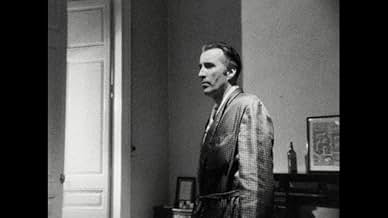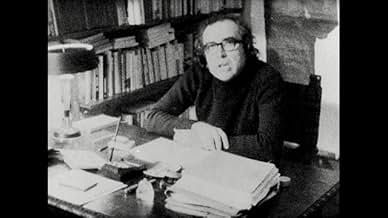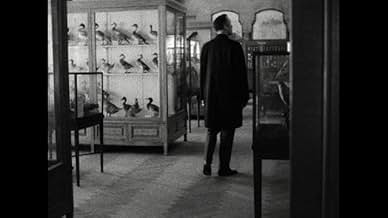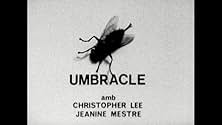Adicionar um enredo no seu idiomaAbsurdist protest movie set in Francoist Spain.Absurdist protest movie set in Francoist Spain.Absurdist protest movie set in Francoist Spain.
- Direção
- Roteiristas
- Artistas
Jeannine Mestre
- The Woman
- (as Jeanine Mestre)
Miguel Bilbatúa
- Self
- (não creditado)
Román Gubern
- Self
- (não creditado)
Joan Enric Lahosa
- Self
- (não creditado)
- Direção
- Roteiristas
- Elenco e equipe completos
- Produção, bilheteria e muito mais no IMDbPro
Avaliações em destaque
Christopher Lee stars in this bizarre avant garde film commenting on censorship in Franco-era Spain that presents documentary footage along with surreal, overexposed scenes in which Christopher Lee walks around Barcelona, witnesses a kidnapping, visits a museum and has silent encounters with a woman. The documentary footage comes in the form of Spanish film-makers talking frankly about censorship in their country and is interspersed with footage from a pro-Franco film glorifying the actions of the army, but it's the surreal scenes starring Lee that are the highlight here. Shot in high-contrast black and white that gives a bold, yet dreamlike quality to the footage, many of the scenes are also exquisitely framed, yet there's no dialogue, no narrative. Any audio we do hear in these scenes is asynchronous from the action on screen - for instance, a conversation occurs, but we aren't able to hear anything but a phone ringing incessantly. While these images are often beautiful and certainly striking, there seems little in the way of meaning. Things get even more confusing when half way through the film breaks to Christopher Lee on stage. He announces that the director asked him to improvise, so he sings some opera and then reads a portion of The Raven by Edgar Allan Poe. Right. Whatever. I've been told that this film is 'a masterpiece of unconscious narrative', but to me it seems little more than some artsy, yet undeniably beautiful footage, used soullessly to bookend fifteen minutes of directors venting about censorship, with a dose of weird for the sake of weird surrealism thrown in for good measure. While probably not worth your, or anyone's time, it is beautifully shot and Christopher Lee looks very suave and dapper while doing not very much at all.
I had watched director Portabella's CUADECUC, VAMPIR from the same year – an experimental behind-the-scenes look at Jess Franco's COUNT Dracula (also 1970), featuring Christopher Lee in his signature role – and, while I had reservations about it (I certainly did not think it was superior to the film it was 'promoting', flawed though that may have been!), it was an undeniable curio. Therefore, a proper film by Portabella 'starring' Lee should make for interesting viewing – but the resulting effort is anything but! Indeed, it merely gives art-house cinema a bad name (for the record, I have NOCTURNO 29 {1968} by this auteur still to check out, and it should be noted that he would briefly serve as a Senator!) – and lends absolute credence to the maxim that it is far more worthwhile to watch a trashy film even though it may be crap rather than pretentious drivel such as this!!
With respect to the recently deceased Lee, it is a well-known fact that he complained about being duped into appearing in Franco's softcore EUGENIE THE STORY OF HER JOURNEY INTO PERVERSION (1969) but he seems to have had no qualms about being connected with this one – which also involves female nudity (in some of the very scenes he is in) – but I guess he was just content here to stray from strictly genre fare, especially since it gave him the opportunity to sing opera (in German and French)! Incidentally, the latter improvised diversions also saw the actor 'losing it' after flubbing one of his lines – apart from reciting Edgar Allan Poe's "The Raven" (many a horror icon has attempted to put his particular stamp on this perennial, but I personally prefer Vincent Price's reading best of all). In other disconnected vignettes, Lee takes to visiting a museum of anthropology and, while roaming the streets (looking solemn and, vaguely sinister, donning shades) witnesses a kidnapping of which, typically, nothing is subsequently made; a fairly obvious in-joke, then, has him relaxing by reading Bram Stoker's "Dracula".
As for the rest of the film (unattractively shot in high-contrast 16mm), this is just as haphazardly taken up by a long-winded discussion about censorship in the oppressive Spain of the time, about a reel of footage from Pedro Lazaga's pro-Fascist war-movie EL FRENTE INFINITO (1959; though listed within as dating from three years previously!), a sketch revolving around two clowns – all these sections are in Spanish and only randomly subtitled, albeit in the same language! – and even snippets of slapstick by the greatest comedians (Chaplin, Keaton, Lloyd and Laurel & Hardy)!! Other 'episodes' get the then-trendy pop song accompaniment – never more ironically than a sequence depicting the systematic, and quite graphic, 'preparation' of live chicken for human consumption underscored by The Carpenters' "Close To You"! By the way, a couple of dialogue passages are shown silent – being replaced on the soundtrack by extraneous everyday noises (such as the incessant ringing of a telephone and a loud hammering din)! Finally, the movie's title is a reference to an architectural structure housing a pathway littered with sculptures and flora indigenous to the Spanish city of Valencia – and thus, unsurprisingly, having virtually nothing at all to do with the on-screen 'action'!
With respect to the recently deceased Lee, it is a well-known fact that he complained about being duped into appearing in Franco's softcore EUGENIE THE STORY OF HER JOURNEY INTO PERVERSION (1969) but he seems to have had no qualms about being connected with this one – which also involves female nudity (in some of the very scenes he is in) – but I guess he was just content here to stray from strictly genre fare, especially since it gave him the opportunity to sing opera (in German and French)! Incidentally, the latter improvised diversions also saw the actor 'losing it' after flubbing one of his lines – apart from reciting Edgar Allan Poe's "The Raven" (many a horror icon has attempted to put his particular stamp on this perennial, but I personally prefer Vincent Price's reading best of all). In other disconnected vignettes, Lee takes to visiting a museum of anthropology and, while roaming the streets (looking solemn and, vaguely sinister, donning shades) witnesses a kidnapping of which, typically, nothing is subsequently made; a fairly obvious in-joke, then, has him relaxing by reading Bram Stoker's "Dracula".
As for the rest of the film (unattractively shot in high-contrast 16mm), this is just as haphazardly taken up by a long-winded discussion about censorship in the oppressive Spain of the time, about a reel of footage from Pedro Lazaga's pro-Fascist war-movie EL FRENTE INFINITO (1959; though listed within as dating from three years previously!), a sketch revolving around two clowns – all these sections are in Spanish and only randomly subtitled, albeit in the same language! – and even snippets of slapstick by the greatest comedians (Chaplin, Keaton, Lloyd and Laurel & Hardy)!! Other 'episodes' get the then-trendy pop song accompaniment – never more ironically than a sequence depicting the systematic, and quite graphic, 'preparation' of live chicken for human consumption underscored by The Carpenters' "Close To You"! By the way, a couple of dialogue passages are shown silent – being replaced on the soundtrack by extraneous everyday noises (such as the incessant ringing of a telephone and a loud hammering din)! Finally, the movie's title is a reference to an architectural structure housing a pathway littered with sculptures and flora indigenous to the Spanish city of Valencia – and thus, unsurprisingly, having virtually nothing at all to do with the on-screen 'action'!
In Umbracle, as a homage, we are introduced Christopher Lee in a few Barcelona's locations of the 70's (though for its technique the film seems much older) such as the old Zoology Museum and we pleasantly enjoy about a different acting of him, but first, all you have to know is that you won't be told a conventional story. This isn't about a tale with a beginning and an end, but different disruptive fragments through metaphors, poetry (Joan Brossa, Edgar Allan Poe,...) and particular metalanguage, sometimes asynchronous, that mostly have to be read between the lines of the images, with the purpose of claiming, showing or more exactly, making you deeply feel shabby elements of repression and censorship (containing one part of spoken documentary) of the so long Franco's dictatorship (1939-1975) and for extension, also opression (indeed so actual nowadays) and war in general. For that, is just a unique film (and most preferred within his filmography for the director as he said today) in the catalan surrealism cinema.
Você sabia?
- ConexõesReferenced in Informe Geral II: O Novo Roubo da Europa (2015)
Principais escolhas
Faça login para avaliar e ver a lista de recomendações personalizadas
Detalhes
- Tempo de duração1 hora 28 minutos
- Cor
- Mixagem de som
- Proporção
- 1.33 : 1
Contribua para esta página
Sugerir uma alteração ou adicionar conteúdo ausente



















